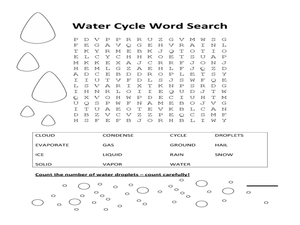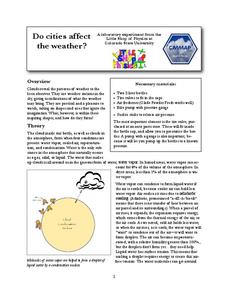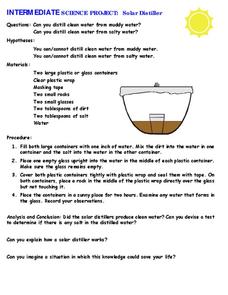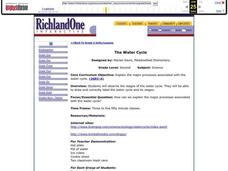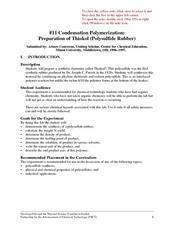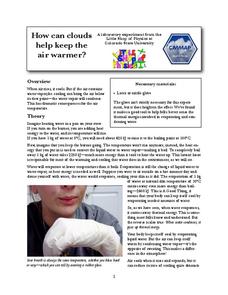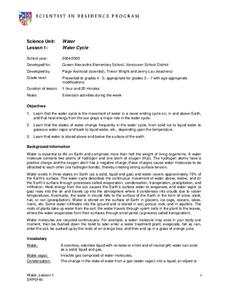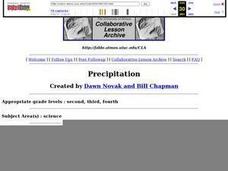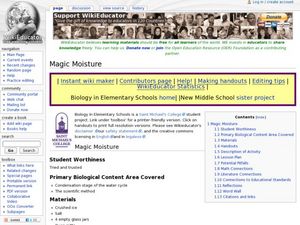Curated OER
The Wonderful world of Water
First graders examine the water cycle through readings and experiments. In groups, they conduct interviews with others and use the information to create a chart displaying the various uses of water. After brainstorming lists of ways to...
Curated OER
Why Does a Puddle Shrink?
Fourth graders describe the relationship between heat energy, evaporation and condensation of water on Earth. They compare evaporation rates when the back of the hand and an equal area of a paper towel are moistened with the wet swab.
Curated OER
The Great Melting Race
Students show their knowledge by choosing the correct answer about solids, liquids and gases. Students also write short answer responses to questions about experiments they have done.
Colorado State University
Do Cities Affect the Weather? (Making a Cloud in a Bottle)
The dynamics of a city can have a drastic effect on the weather. A hands-on lesson asks learners to build a model to illustrate how city pollution provides a nucleus for condensation. The greater the pollution, the greater chance for...
Discovery Education
Smoke on the Water
How do clouds form? Learners demonstrate the formation of clouds and the water cycle by testing four different setups in a plastic bottle. They identify the key components of a cloud to help them understand the process of cloud...
Signing Time Foundation
What is the Water Cycle?
Dive into an exploration of the water cycle cycle with this simple earth science lesson. After first discussing where rain comes from, young scientists define the terms condensation, evaporation, transpiration, and precipitation as a...
Curated OER
The Water Cycle in a Bowl
Students conduct an experiment on the stages of the Water Cycle. In this water cycle lesson plan, students view the materials needed for the experiment and brainstorm how they relate to the Water Cycle. Students conduct an experiment...
US Department of Energy
Solar Distiller
Explore the sun's ability to distill contaminated water with this simple set of classroom experiments. After filling two glass bowls, one with muddy water and the other with salt water, they are covered with plastic wrap and placed in...
Curated OER
The Water Cycle
Second graders conduct an a water cycle experiment. In this water cycle lesson plan, 2nd graders observe a puddle of water, they predict how it got there and what will happen to it. Students watch a demonstration on the water cycle and...
Curated OER
Condensation Polymerization: Preparation of Two Types of Polyesters
College-level or AP chemists use phthalic anhydride to synthesize two different polyesters, one linear and one cross-linked in structure. A detailed materials list and well-written procedures are provided on a lab sheet. Learners write...
Curated OER
Condensation Polymerization: Preparation of Thiokoll® (Polysulfide Rubber)
This lab activity is geared toward experienced chemistry learners, in particular, those who are familiar with organic chemistry. They will create a synthetic elastomer and then make observations and measurements of its different...
Curated OER
The Cloud Case
Young scholars discover how clouds form and how air pressure and air temperature affect their formation. The lesson is delivered in the story of Mike Breezy, Air Detective, who tries to solve The Cloud Case.
Colorado State University
How Can Clouds Keep the Air Warmer?
Condensing water warms the air around it. Young scholars consider this concept as they experiment with air temperature around evaporating and condensing water vapor. They simulate the formation of clouds to experience the associated...
Museum of Science
Cloud in a Bottle
Perhaps one day humans will learn to control the weather. Future scientists simulate clouds and fog in a plastic bottle. They conduct an experiment where they place smoke and hot water in the bottle, then squeeze and release repeatedly....
Scholastic
What Are Clouds Made Of?
Tiny bubbles, in my...clouds? Offer youngsters a hands-on, visual learning experience when reviewing the scientific concepts of condensation, water vapor, and the collection of droplets that make up clouds.
National Wildlife Federation
The Water Cycle
Observe the water cycle from the comfort of your classroom with this excellent earth science experiment. Working collaboratively, young scientists first create terrariums complete with hills, plants, lakes, and an atmosphere,...
Curated OER
Water Cycle
Young scientists explore Earth elements by conducting an experiment. They define water vocabulary terms such as condensation and precipitation. In addition, they conduct a water experiment in which they build a terrarium, so they can...
Curated OER
Precipitation - Pot of Ice/Pot of Boiling Water Experiment
Students observe an experiment where a pot of ice is held over a pot of boiling water. They predict what will happen and then share what they see as the experiment takes place. Then the concept of condensation and precipitation is...
Curated OER
Condense, Combine, or Categorize New Information - Your Brain and Moral Decision-Making
Young scholars condense information and create a summary paragraph on a video segment. In this brain activity instructional activity, students watch a video that chronicles an experiment in how the brain responds when making moral...
Curated OER
Condensation Polymerization
This organic chemistry lab activity is appropriate for teaching polymerization, percent yield, melting point, or the types and uses of polymer materials. Chemistry pupils imagine that they are working for a company to develop a special...
Curated OER
Condensation Polymerization: Preparation of Nylon 6/6
Students participate in a lab activity in which they synthesize nylon 6/6, calculate the percent yield by mass, identify the polymer as thermoplastic or thermoset, and determine the melting point, density and end-product use of the polymer.
Alabama Learning Exchange
WATER You Doing to Help?
Auntie Litter is here to educate young scholars about water pollution and environmental stewardship! Although the 15-minute video clip is cheesy, it's an engaging look at the water cycle and conservation. Learners start by illustrating...
Curated OER
How Do You Dew?
Students examine how the processes of condensation and evaporation occur. They describe the relationship between heat energy, evaporation and condensation of water on Earth. They give examples of the processes of evaporation and...
Curated OER
Magic Moisture
Students discover the process of condensation. In this experimental lesson, students hypothesize and conduct an experiment to determine where the water comes from during condensation.




